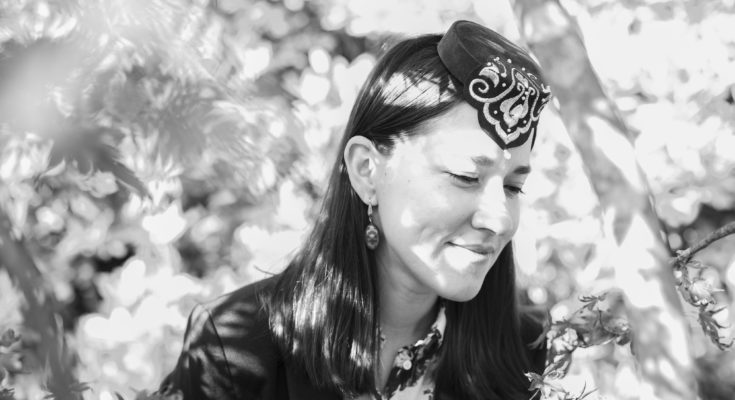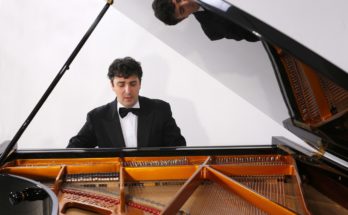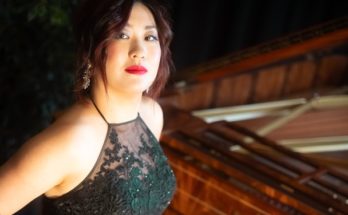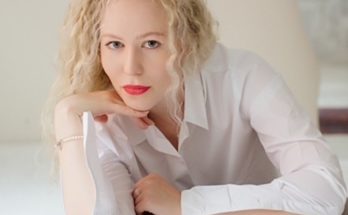This time PianoMe caught up with Aliya to talk about the history of Tatar music and also about her experience of teaching music. We also spoke about her current initiatives and upcoming projects and she told us why she likes PianoMe’s idea.
PianoMe (PM): Dear Aliya, thank you very much for your time! It is a great pleasure for us that you are ready for an interview with PianoMe!
Aliya Iskhaki (AI): Thank you for giving me this time and inviting me for an interview!
PM: That’s great, thank you! First of all, we would like to briefly introduce you to our readers, even though many of them probably already know who you are. You are the prize winner of many international piano competitions and have developed your own style of piano playing. You have over 10 years of professional experience in teaching and also over 20 years of professional experience in the performing industry. You give solo and chamber music recitals, mainly in Europe, and are actively engaged in performance activities. Now you are primarily working as a professional pianist and performer within Duo Mong and Aida Duo.
AI: Thank you! I am happy to have this conversation with you!
PM: That sounds great! Can you please tell us first how you got started playing the piano?
AI: My start was a bit uncommon; no one from my family had any connection to music. Despite this, I begged my parents to take me to a music school. So, when I was seven, my grandmother finally brought me to the school next to our house, and I started learning to play the piano. It was just a hobby, but at 12 I decided to become a professional musician. So, I went to Kazan Musical College and, after that, to Kazan Conservatory. Then, I met some talented young pianists at a piano competition in France who inspired me to continue my education in Europe. Accidentally, I ended up in the Netherlands.
PM: Interesting! How did the move to the Netherlands affect your playing?
AI: Significantly! I realized how different approaches to playing can be and even the criteria for a good piano sound, depending on the country and education system. It took me quite some time to accept the subjectivity of our profession and finally to find “my own truth”. Definitely, studying in the Netherlands broadened my artistic views and tastes.
PM: Growing up in Kazan, you were likely able to see the roots of classical piano performance in your country. Would you like to tell us more about Tatar music?
AI: Of course! What we call now Tatar classical music or professional Tatar music isn’t the original music art of Tatars. It appeared only in the 20th century by combining Tatar traditional music with Western European forms and genres. The original or traditional one was based on the Eastern tradition, which means it was never written down, it was passed only orally from the teacher to the student. There were other forms and genres, and it was based on improvisation. Unfortunately, the biggest part of that tradition is almost lost now due to the significant impact of the Soviet period. On the other hand, we have classical Tatar music which appeared in the 20th century due to the Westernization of music education. It is a blend of folk melodies with classical forms and genres. And this is the type of music that I play myself as a classical trained pianist.
PM: How would you describe the Tatar music style?
AI: The base of Tatar music style is the concept of “moñ”. It is an untranslatable word that describes Tatars‘ perception of the complex world and art. It can be understood as a mix of melancholy, sadness and joy simultaneously. In a way, it is the same idea as Portuguese fado for example. Another difference is the pentatonic mode. This is why all listeners when they hear Tatar music for the first time compare it with Chinese or Japanese music.
PM: Did you present your music in Kazan in the same way as at your concerts in Europe or are there differences?
AI: No, to be honest, back then I didn’t care about Tatar music at all. In general, I wasn’t interested in my ethnical roots till I moved to the Netherlands. Also, if you study classical piano, this music is played mostly in music schools and not in the later stages of education. Because it is considered to be not demanding or challenging enough for your development. Although there is an annual Tatar music festival, the creativity of young Tatar composers is well supported too, inside of conservatory walls, although it doesn’t sound much. Such a paradox…And on the contrary, here in Europe it gets a big reception and interest!
PM: Very interesting! From your years of teaching piano, what is the main difficulty students have while learning the piano? How do you help them to overcome it?
AI: That depends on age and what they are aiming for. Children have to be constantly motivated and interested in the process. And that is impossible to do only by pressuring them to practice a lot or suppressing them psychologically, as it was very common in the past, also when I was studying myself. I never had a goal to make every child a professional pianist; growing in their interest and love towards music is always my priority.
PM: As an experienced piano teacher, what would you consider the three most important traits of a good piano teacher?
AI: Patience, kindness, and a love for teaching.
PM: Now you have built a perfect bridge between musical education and artistic identity. Let us now briefly talk about the project “Duo Mong”: can you please tell us what makes this Duo especial?
AI: This a duo with my friend violinist Yulia Gubaydullina (just in case: she is not a relative of Sofia Gubaydulina (laughing)) We started to play together back in Kazan and continued when Yulia also moved to the Netherlands. At that time, I already had the idea of performing Tatar music more actively and in a chamber music setting. Yulia’s arrival was a sign (laughing). We got noticed fast and were invited to perform at Grachtenfestival, one of the main music festivals in the Netherlands. But then the pandemic came and we had to go online. So, we started making videos about Tatar composers in English, with short biography information and some of their pieces. Now we perform actively again and continue to include Tatar music in our programs. Last year, we were invited to play at the 90 years anniversary celebration of the Tatar society in Finland.
PM: Interesting! You just released your debut CD “The Essence”. To be honest I’m not aware of further music recordings of Tatar composers, which are released in Europe. Can you tell us more about this project?
AI: Recording the CD has been in our plans for a long time. You see, there are no modern recordings of Tatar classical music at all, most of them were made decades ago and available only in the libraries in Tatarstan. We wanted to make it available to anyone, Tatars living outside of Tatarstan and those who will discover it for the first time. Last year, we started preparing to make it happen. We chose the music of the most important Tatar composers of the past, such as Farid Yarullin, Rustem Yakhin, Almaz Monasypov and young composers Ilyas Kamal and Millyausha Khayrullina. Thanks to the incredible support of Tatars from all over the world and new Tatar music lovers, we launched our crowdfunding and obtained the finance to record and release our digital album. This is truly a unique project. It is our debut album and the first European Tatar classical music album available worldwide! We hope this will be the first step in bringing Tatar music into big concert stages and letting people discover the Tatar nation, too.
PM: I see. Actually, a very interesting idea. By the way, as a musician yourself, you know that the journey is never sweet and easy. What advice would you give to someone hoping to build a career as a musician?
AI: If you really love music and can’t imagine your life doing something else – then everything will come! Don’t try to be like someone: study, live, get your experience in life outside of music too and find your own path.
PM: Very interesting! I’m really sorry, but I have to ask (laughing). What is your opinion on sharing rehearsal spaces by hosting a studio on an hourly basis?
AI: I find this a perfect solution for some occasions! For example, you come for an entrance exam or a competition, and you don’t have enough space or sufficient time to practice in a prearranged space. It can be difficult to find a studio in a new city or country whilst having no time to research. So, I find PianoMe a very useful service to have!
PM: Thank you! Finally, what are your aims for the future? Would you like to share any announcement with our readers?
AI: Right now, I am working on some new concert programs, solo and in duo with Yulia. I plan to continue playing and spreading Tatar music, and maybe very soon will start a new crowdfunding campaign for a solo CD this time! In any case, you can always check my website or social media to find the latest news and updates.
PM: Dear Aliya, we thank you for the interview and wish you all the best! See you again soon in the rehearsal rooms or concert halls of PianoMe.
AI: Thank you, and hopefully, till next time!
Copyright Photo: @Ira Yugai




